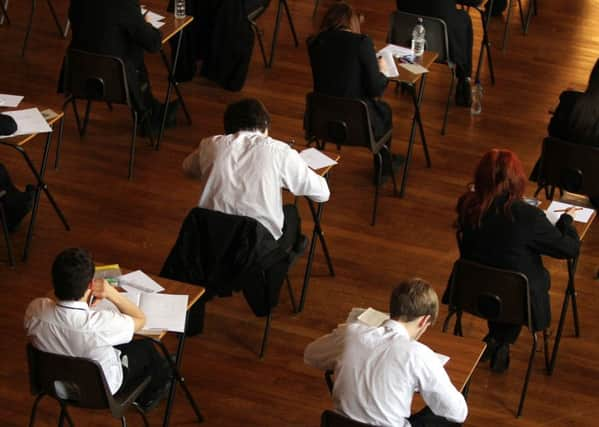Jayne Dowle: Increasing exam pressure on pupils is not the answer


Jack has already been in tears several times. It’s heart-breaking to see your 6ft 3in tall teenager crumple like a toddler because his brain simply won’t accept any more information. In response, I swing wildly from sympathy to frustration.
The sympathy is based on acute memories of my own exams. My O-levels were a train crash of “can’t be bothered” and I paid the price with embarrassment and re-sits. My A-levels were planned as a strategic exercise. I only chose subjects I enjoyed. Lloyd George’s welfare reforms? Loved them.
Advertisement
Hide AdAdvertisement
Hide AdAnd my Finals? It’s probably fair to say that only a nun would have had more fun for the three months before, but I was mature enough to realise that I was only going to have one shot at getting a decent degree. I drew up a strict revision timetable and got my head down with Wordsworth and Middle English.
I try to bring all of this experience to bear in my conversations with Jack, but whatever I say the lure of the PlayStation and Snapchat is strong. Last weekend, I even threatened to switch off the internet at the wall and hide the access code.
I recognise that it’s not the most helpful of reactions from a parent. I’ve read all the stuff about offering healthy snacks and iced water to teenage offspring struggling with committing to memory the finer points of the periodic table.
This however, is not much comfort on a rainy Saturday afternoon when your son insists that he’s doing revision but you can hear him roaring with laughter on some live chat forum with his friends, who presumably aren’t doing any revision either.
Advertisement
Hide AdAdvertisement
Hide AdHowever it might appear this is not entirely hapless behaviour. I’ve revised for enough exams myself to know that all this messing about is classic diversion tactics. Why endure the anxiety of sitting down with a maths work-book when you can shoot the breeze with your friends?
I suppose I should be grateful that at least Jack’s letting off steam and not staring at the wall with a bottle of tranquillisers in his hand. Exam stress is one of the biggest factors behind the staggering rise in mental health issues amongst children and teenagers in the UK.
Last year, a survey carried out by the Key, a national school support service, reported that eight of 10 primary school leaders reported that their pupils were displaying serious symptoms of stress during SATs tests. Some children had lost all their eyelashes because of anxiety. These are 10 and 11-year-olds we’re talking about.
That’s just one of the reasons why Schools Minister Nick Gibb’s solution is preposterous. He’s arguing that school children should sit more exams from an early age so that they can learn to cope with stress.
Advertisement
Hide AdAdvertisement
Hide AdI’d like him to come and explain that to my son who found his Year Six SATs so stressful that he screwed up the practice papers and ran off in hysterics down the garden. I had to beg his teacher not to send any more home. I can’t even recall what his final test scores, the whole thing was so traumatic.
That’s why I’m so glad that the academy secondary school he attends takes a much more constructive approach to GCSE preparation than anything Mr Gibb has suggested so far. It’s operating a “twilight school” until 6pm every evening, offering pupils targeted revision support and help with exam techniques.
In Jack’s case, for instance, this is learning how to read a history question effectively in order to answer it without straying wildly into the realms of fantasy. Simple tricks, but they could mean the difference between a solid pass and a sorry fail.
If Jack does manage to achieve his GCSEs, it will be because he’s lucky enough to go to a school which is prepared to support every single one of its pupils. And I know from talking to his teachers that this is not because the school wants to climb the exam league tables. Although this is obviously a factor, it’s because it wants every pupil to make the most out of their potential.
Advertisement
Hide AdAdvertisement
Hide AdThis level of support costs money of course, not only in extra payments for extra teaching hours, but heating, lighting, security and I’m told, sometimes free pizza to keep spirits up. It also demands a huge degree of commitment from both school management and individual teachers, who can’t scoot off home at 3 o’clock. Personally, I think it’s amazing. Responsive pupil-centric teaching, the absolute antithesis of rote learning and pointless testing.
If he really wants to help raise standards, Mr Gibb should fund this kind of programme in every secondary school in the country. I can’t tick every multiple choice box correctly on Jack’s chemistry papers, but I do know that putting youngsters through even more exams is not the answer to the question of GCSE stress.